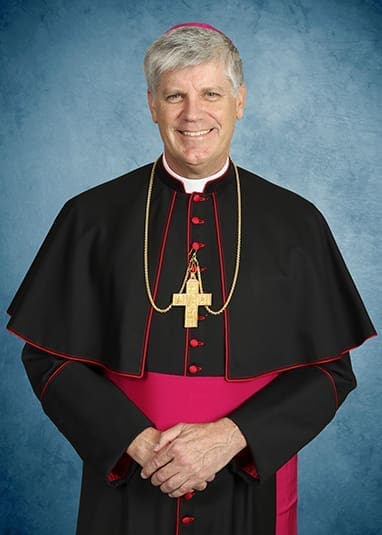Toward unity through loving dialogue rather than debate
By BISHOP BERNARD E. SHLESINGER III, Commentary | Published November 11, 2021 | En Español
At the beginning of a sporting event, we may hear the cliché, “Shake hands, and may the best man, woman or team win.” Once the competition begins, failure to show respect in sports may result in penalties or a possible ejection of a player. For example, the “taunting rule” in football prevents players from excessively taunting the opposition and gains a 15-yard penalty that hurts a team.

Bishop Bernard E. Shlesinger III
With the hope of fruitful dialogue in the upcoming synod of the Catholic Church, we may find ourselves more willing to enter a debate than dialogue. If we simply debate as in a competition, we may overlook the repercussion that this will have to unity. For example, we may simply succumb to defending and entrenching ourselves in our own political views which we may reinforce with the help of media sources that fuel our emotions.
Jesus prayed for unity among his disciples and that this unity will be preserved in his church for all time for others to see:
“I pray not only for them, but also for those who will believe in me through their word, so that they may all be one, as you, Father, are in me and I in you, that they also may be in us, that the world may believe that you sent me” (Jn 17:20-21).
St. Paul had to constantly deal with the problem of factions in various communities and recognized the dangers that debates could cause:
“For it has been reported to me about you, my brothers, by Chloe’s people, that there are rivalries among you. I mean that each of you is saying, “I belong to Paul,” or “I belong to Apollos,” or “I belong to Cephas,” or “I belong to Christ.” Is Christ divided? Was Paul crucified for you? Or were you baptized in the name of Paul?”
In calling forth a synod for the church, Pope Francis is concerned about our ability to listen to one another and the Holy Spirit. He challenges us to enter into a spirit of “accompaniment” with one another. If we do not do this, the divisions that we have in the church will remain a scandal for the world to see. If the love of Christ is no longer visible when two or more gather in his name, our young people will simply see a dysfunctional family that they do not want to be part of. Polarization rather than unity will remain visible in the church.
As we begin our synodal process in the church by listening to the Holy Spirit and to one another, let us pray for the grace to not become defensive toward one another. Let us heed the urgent plea of St. Paul.
“I urge you to live in a manner worthy of the call you have received, with all humility and gentleness, with patience, bearing with one another through love, striving to preserve the unity of the spirit though the bond of peace (Eph 4:1-3).